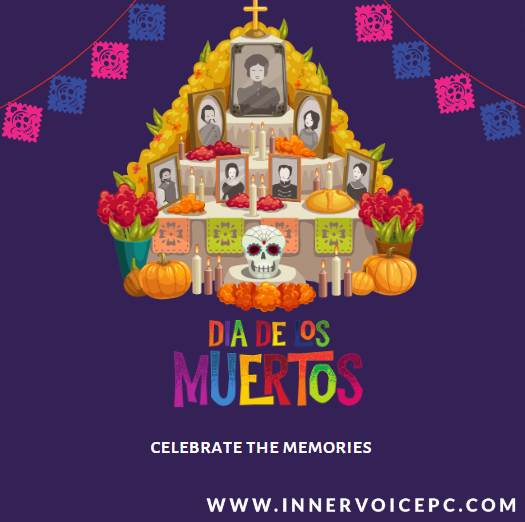
Dia De Muertos
Exploring ancestral narratives, traditions and the immigration experience in therapy
By Abril Martinez, LPC-C
“Dia de muertos” is one of those celebrations that can awaken all of your senses just by thinking of it. The warmth and chatter of family gatherings, the colorful “ofrendas”, the smell of the cempasuchil flower and the taste of the traditional “pan de muerto”.
But above all, it’s a celebration of our ancestors.
This makes me think of the significance of the transmission between generations, the individual ability to receive what’s given to us and the quality and context of that transmission.
No doubt, we all come from someone who existed before us, but the ideas and narratives we create to understand that which precedes us can shape our identity.
I believe that those narratives we tell ourselves are at the core of who we are. We can have more or less awareness of them, we can play them out by repetition or we can fight against them so they don’t come to life. The complexity of the human mind makes this type of internal experience, and the ways in which we interact with it, a fertile ground for different conflicts and endeavors.
Sometimes these narratives happen to align with the environment we are in, the expectations of us as individuals and as a part of a community. Other times, they don’t.
There is another possible experience; when our idea of ourselves happens to align with what we think is expected from us. While externally, it looks we align with the expectations, but internally there is a struggle to make them work together.
I will name what I described above, for the purposes of this post, “the immigrant experience.”. The experience of being a foreigner, acting like anyone else, when internally they feel like an outsider both to their “ancestors” and to their “natives” They may feel trapped in an oblivion where nothing seems in its logical place.
Some people can relate to the experience I’ve described, while others may not understand.
In the therapeutic processes, we create adjusted narratives with more depth and layers to achieve a thorough comprehension of the personal experience of being othered by our own internal worlds, our narratives, and how they interact with our external reality.
Traditions pass on from generation to generation, not in empty repetition, but usually with affection for those who came before us. We tend to pursue, keep, and value what was given to us through a bond, a “good enough” bond, that allowed us to receive and represent what was given to us.
In therapy, I like to think of the idea of good enough as something that encompasses a sufficient amount of the good-feeling moments to counterbalance the bad-feeling moments. All bonds have good moments and bad moments; the problem is when one surpasses the other. We either idealize or we demonize, but both responses withdraw us from a real and emotionally mature experience.
The ways we represent our ancestors impacts the strength and depth of our relationships and consequently embodiment of traditions. When we have representations biased by continued experiences of trauma, loss, and emotional pain we may internalize a source of pain that is too distressing to carry with us as part of our traditions.
We close doors, we shut people off, we grow walls, or we wear masks. We disconnect. We are hurt.
We can live a life full of traditions — representations of those who were significant to us — or we can decide not to follow those traditions because those who transmitted them were not emotionally significant, were ambivalent, or rejected.
In the same way you feel part of something— if you have been able to internalize tradition — that goes with you wherever you go, a foreigner to their own home can always feel a foreigner, even when they are close to home.
I believe that for traditions to persist they need to be alive with emotions, affection, and symbolism. Once they are alive they come with us wherever we go.
Through therapy we create a path, made of resources from previous relationships: memories, trauma, love, shame, gratitude, sadness, happiness. Every resource is welcome and is needed to build that path. This path will enable the traveler to make repairs, put signs up, open roads, build bridges, and create a map to their internal world, a map which allows them to navigate more freely and authentically.
If you are are looking for Chicago counseling related to identity, culture and generational concerns or are struggling with any mental health issues, our therapists here at IVPC can guide and support you through grief and loss.
Abril Martinez, LPC-C is a Chicago based, bilingual (Spanish/English), culturally sensitive psychotherapist who is passionate about working with diverse populations, nationalities and cultures. She has 8 years of clinical experience and brings an international perspective, cultivated across multiple continents.